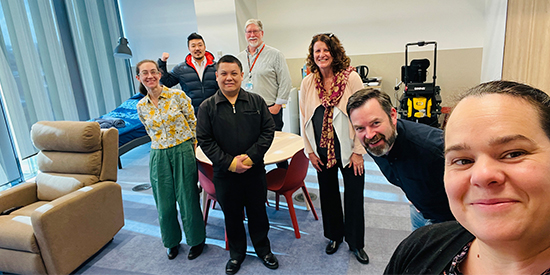Australian 'MemoryAid' project awarded share of $2.9 million as finalists in UK’s prestigious Longitude Prize on Dementia
Media release
Australian 'MemoryAid' project awarded share of $2.9 million as finalists in UK's prestigious Longitude Prize on Dementia
The 'MemoryAid' device, developed by a team from Deakin University and Western Sydney University, is among the five innovative technology solutions announced as global finalists in the Longitude Prize on Dementia.
As the only Australian technology solution to advance through to the finals, the multidisciplinary research team have been awarded over $580,000 AUD to develop their digital solution for use by people living with dementia.
Project lead Associate Professor Celia Harris from Western Sydney University's MARCS Institute for Brain, Behaviour and Development said that MemoryAid is a home assistance device resembling a traditional telephone, allowing people living with dementia to maintain their independence for as long as possible.
The familiar-looking device offers a screen for video calls and makes video-calling loved ones as intuitive as picking up a ringing phone. The device can also display personalised reminders of daily activities, and the phone connects users to a reassuring voice-recording of their choice that shares prompts on daily activities and displays images of items in that person’s house.
'In developing MemoryAid, we aimed to empower people living with dementia to do things they love that bring meaning. We wanted to build a technology that is a tool for people with dementia to use themselves, to do the things they value the most and to stay connected to their loved ones,' said Associate Professor Celia Harris.
'Recognition from the Longitude Prize is a testament to the power of co-design, allowing us a platform to share the voices of people with dementia and their families regarding what they want and need technology to do for them. It's given us an imperative to work as hard as we can to get MemoryAid out into the world so that people can benefit from it.'
Dr Simon Parker, Head of Major Projects at Deakin University's Applied AI Institute (A2I2) said MemoryAid aims to have transformative impact for people living with dementia by actively enabling and supporting living at home independently for longer.
'The complexity in MemoryAid is invisible to the user, where the system is working hard to make it as easy as possible for people with dementia to achieve the things that are most important to them,' said Dr Parker.
'We designed the interface and infrastructure that drives the user experience.'
Designing in consultation with people living with dementia, carers, and their families had highlighted that good technological solutions need adjustable prompts for changes in cognition, including fluctuating 'good days' and 'bad days', and for changes in support needs over time.
A former psychologist, Bobby Redman, was diagnosed with frontotemporal dementia in 2016 and is now an advocate for people living with dementia.
Bobby, who is part of the MemoryAid Advisory Panel said personalisation is very important as different people have different needs.
'Some of us living with dementia have memory issues, and others have issues such as the ones I deal with, which is poor sequencing. This means that I may do things at the wrong time, in the wrong order, or could miss out steps in an activity or task. So, even though I use technology, and I live independently, I still need prompts,' said Bobby.
'Having your own voice on there, or a recognisable voice, is useful. Sometimes, things like Siri or Alexa or Hey Google have a voice we don’t recognise, so we don't necessarily respond.
'I like recordings in my own voice because I don’t feel as if I'm being told what to do. I’m not very good at doing as I'm told. If people are used to responding to their carer’s voice, then it's good to use that carer's voice.'
For 10 years, Bill Blair was the sole carer for his mum with dementia. As a member of the MemoryAid Advisory Panel, Bill said that MemoryAid provides both the person living with dementia and the carer with ongoing support for the future to be able to handle a transition of stages with flexibility and adaptability.
'I would have loved for this to have been around when I first started looking after my mum, because there was nothing, absolutely nothing. I know what carers go through and I think they need this kind of support, it also helps with social connection for the person living with dementia,' said Bill.
The Longitude Prize on Dementia rewards the creation of new assistive technologies that use AI to transform how people live with dementia after a diagnosis so that they can maintain their independence for as long as possible.
Based on a 300-year history of funding international scientific discovery and finding solutions to intractable problems, the Longitude Prize on Dementia is an $8.5 million AUD prize funded by Alzheimer’s Society and Innovate UK and delivered by Challenge Works.
The five finalists, including the MemoryAid team, will share $2.9 million AUD to develop their solutions in pursuit of a First Prize of over $1.9 million AUD, which will be awarded in early 2026 following a judging process with the international Judging Panel and Lived Experience Advisory Panel.
For more information on the finalists and prize, please visit https://dementia.longitudeprize.org/

